《中考英语》初中英语语法知识—代词的知识点总复习
- 格式:doc
- 大小:44.00 KB
- 文档页数:8
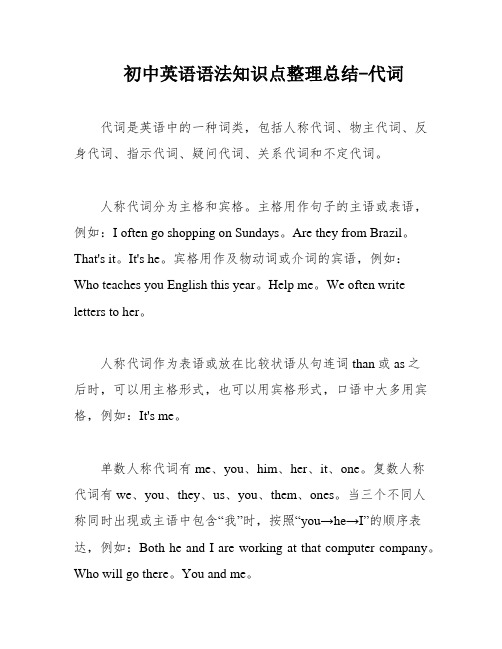
初中英语语法知识点整理总结-代词代词是英语中的一种词类,包括人称代词、物主代词、反身代词、指示代词、疑问代词、关系代词和不定代词。
人称代词分为主格和宾格。
主格用作句子的主语或表语,例如:I often go shopping on Sundays。
Are they from Brazil。
That's it。
It's he。
宾格用作及物动词或介词的宾语,例如:Who teaches you English this year。
Help me。
We often write letters to her。
人称代词作为表语或放在比较状语从句连词than或as之后时,可以用主格形式,也可以用宾格形式,口语中大多用宾格,例如:It's me。
单数人称代词有me、you、him、her、it、one。
复数人称代词有we、you、they、us、you、them、ones。
当三个不同人称同时出现或主语中包含“我”时,按照“you→he→I”的顺序表达,例如:Both he and I are working at that computer company。
Who will go there。
You and me。
人称代词it除了可以指人指物之外,还可以表示“时间、天气、温度、距离、情况”等含义,此外还可以作为“非人称代词”使用,替代作主语或宾语的不定式、动名词或名词性从句,例如:What's the weather like today。
It's fine。
What's the time。
It's 12:00.为反身代词的作用是强调动作的执行者与承受者是同一人或同一事物。
反身代词通常位于动词或介词后面。
如:I XXX XXX XXX(我在打篮球时弄伤了自己。
)He always talks to himself when he is alone。
(他独自一人时总是自言自语。

初中英语知识点总结:代词篇初中英语知识点总结:代词篇代词是代替名词的一种词类。
中的代词,按其意义、特征及在句中的作用分为:人称代词、物主代词、指示代词、反身代词、相互代词、疑问代词、关系代词和不定代词八种。
一、人称代词是表示"我"、"你"、"他"、"她"、" 初一;它"、"我们"、"你们"、"他们"的词。
人称代词有人称、数和格的变化,主格在句中作主语;宾格作宾语,用在动词和介词之后。
例如;I will write to her tomorrow.人称代词见下表:二、物主代词是表示所有关系的代词,也可叫做代词所有格。
物主代词分形容性物主代词和名词性物主代词二种,其人物和数的变化见上表。
形代后必须有名词,名代后不必加名词,名代=形代+名词如:I like his car. 我喜欢他的小汽车。
Our school is here,and theirs is there. 我们的学校在这儿,他们的在那儿. 本句中theirs=their school。
三、反身代词是表示"我自己"、"你自己"、"他自己"、"我们自己"、"你们自己"和"他们自己"等的代词,也叫做自身代词。
变化规则:一二人称在形容性物主代词后加self(单数)或selves (复数)。
第三人称在宾格后加self(单数)或selves (复数)。
如:She was talking to herself. 她自言自语。
阶段常用的短语有 teach oneself自学,dress oneself 自己穿衣,come to oneself 恢复知觉,enjoy oneself 过的快活, help oneself to 随便吃、随便用,make youself at home 不受约束,by oneself 独自地; 单独地,speak to oneself 自言自语四、指示代词有this,that,these,those等。

中考人教版初中英语语法代词之反身代词指示代词和不定代词讲解和练习同学英语学科核心素养培养与个性发展研究1.There are several pretty girls standing under the tree, but ______ are known to me.a. neitherb. nonec. no oned. all2.In one year rats eat 40 to 50 times ______ weight.a. itsb. andc. theird. theirs3.You’d better continue to use the same spelling of your name as ____ you used in your application.a. oneb. the onec. anyd. some one4.The little baby was left alone, with ______ to look after it.a. someoneb. anyonec. not oned. no one5.John can play chess better than ______ else.a. the oneb. no onec. any oned. another6.The weight of something is another way of describing the amount of force exerted on __ by gravity.a. itb. themc. thatd. one7.It is one thing to enjoy listening to good music, but it is quite ______ to perform skillfully yourself.a. otherb. anotherc. somed. any8.Children should be taught how to get along with ______.a. anotherb. otherc. othersd. any other9.The poor man lived on wild berries and roots because they had ______ to eat.a. nothing elseb. anything elsec. something otherd. nothing other10.I go to the cinema ______ day, Tuesdays, Thursdays, and Saturdays.a. each otherb. every otherc. this and the otherd. all other11.One of the properties of light is _____ traveling in wave form as it goes from one place to another.a. itb. it’sc. itsd. their12.______ in the world has been asked to do his duty for the human society.a. Each of the trampsb. Every of the trampsc. The each trampd. The every tramp13.In some restaurants, food and service are worse than ______ used to be.a. theyb. itc. themd. that14.Let the porter take all the baggage out and put ______ in the lobby.a. itb. theyc. themd. its15.Everyone who comes to the party is given a wooden apple with _____ own names cut in it as a souvenir.a. hisb. herc. theird. our16.Everybody in the class must give in ______ exercise book within the given time.a. theirb. ourc. hisd. her17.During the journey, the boys and girls entertained ______ with songs and games.a. themselvesb. theirselvesc. himselfd. itself18.You’d better buy ______ some fruits when you go on a trip.a. youselfb. myselfc. yourselfd. you19.The boys in this town like to bully ______.a. one anotherb. one and otherc. each otherd. one and the other20.One common family name is Black,______ is Anderson.a. anotherb. the otherc. othersd. none other21.I have two novels: one of the two is “Gone with the Wind’, and ______ is “the Tale of Two Cities’.a. anotherb. otherc. none otherd. the other22.All girls wear beautiful clothes. Some are dressed in red;______ in green.a. otherb. anotherc. othersd. none other23.She can’t seem to help herself. And ______ c an help her, either.a. none elseb. no one elsec. not anyd. somebody else24.Children can usually dress ______ by the age of five.a. himb. themc. hiselfd. themselves25.The gold watch had belonged to me for years, but the police refused to believe it was ______.a. meb. myc. mined. I’s26.Mother would not let Mary and ______ attend the hockey game.a. Ib. myc. med. we27.In a news conference this afternoon, the university announced that ______ intends to make sev eral important changes in next year’s budget.a. heb. itc. shed. they28.______ but a fool can make such a mistake.a. Everyoneb. No otherc. Not alld. None29.The poem by Browning is so observed that I cannot grasp ______ meaning.a. itsb. it’sc. theird. that30.The mayor felt that the police, in spite of the reports, had done ______ best.a. itsb. theirc. hisd. our31.I haven’t read ______ of the last four chapters, so I know little about them.a. anythingb. anyc. somed. something32.A pretty face may win friends but it takes character and personality to hold ______.a. itb. themc. thatd. one33.In the discussion, one speaker held that, since we live in a money-oriented society, the average individual cares little about solving ______.a. anyone else’s problemsb. anyone’s else problemsc. anyone else problemsd. problems of anyone else34.I don’t know whether small oranges are sweeter than big ______.a. thoseb. onesc. oned. that35.‘How much water is left in the bottle?’ ‘______’a. Nothingb. Nonec. Not somed. Not one36.It took two of them to do the work that ______ of us could do.a. someoneb. anyonec. any oned. everyone37.He has five children, and ______ of them is good at painting.a. everyoneb. everybody d. every one d. every38.I have three brothers,______ are in Beijing.a. no one of themb. neither of themc. some of themd. none of them39.Some of my students study a lot,______ just don’t care.a. anothersb. the otherc. some otherd. others40.As a matter of fact, Saudi Arabia’s oil reserves are second only to ______.a. Kuweitb. that of Kuweitc. Kuweits’sd. those of Kuweit41.This book of _______ used to be one of the best sellers in the shop.a. hisb. himc. that mand. this42.We should always keep ______ well-informed of the changing information.a. usb. oursc. ourselvesd. we二、英语书面表达专项训练2.假如你是李华,你的英国笔友 Jack 给你写邮件表达了想参加你校暑期为外国学生举办的汉语夏令营的愿望,希望你告知活动举办的具体时间地点,活动安排以及你的建议。

中考代词知识点总结一、人称代词人称代词用来表示说话人、听话人和与说话人或听话人有关的人或事物。
在中考英语考试中,人称代词的使用是非常常见的。
1. 主格形式:I, you, he, she, it, we, they。
例如:I am a student.You are my friend.He is a teacher.She is my sister.It is a cat.We are in the same class.They are good students.2. 宾格形式:me, you, him, her, it, us, them。
例如:He likes me.I see you.We help him.She loves her.It follows it.They call us.I miss them.3. 形容词性物主代词:my, your, his, her, its, our, their。
例如:This is my book.Is this your dog?That is his bike.Her name is Lily.Its color is yellow.Our teacher is strict.Their parents are doctors.4. 名词性物主代词:mine, yours, his, hers, its, ours, theirs。
例如:This book is mine.Is this dog yours?The bike is his.The cat is hers.The house is ours.The toys are theirs.5. 反身代词:myself, yourself, himself, herself, itself, ourselves, themselves。
例如:I see myself in the mirror.You should do it yourself.He hurt himself.She enjoys herself.It cleans itself.We find ourselves lost.They talk to themselves.二、指示代词指示代词用来指示人或物,常见的指示代词有this, that, these, those等。
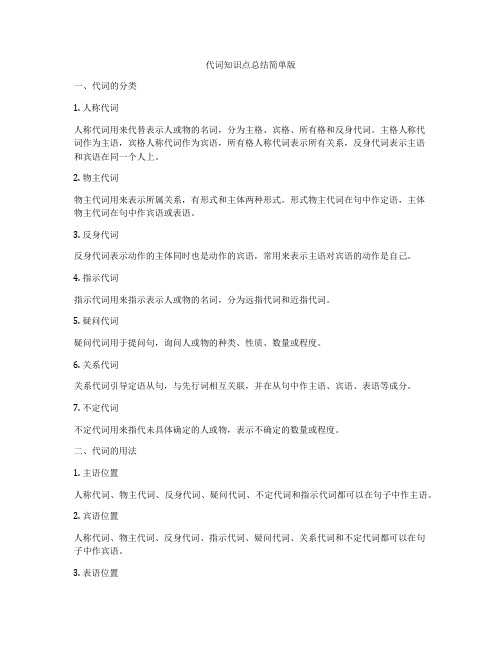
代词知识点总结简单版一、代词的分类1. 人称代词人称代词用来代替表示人或物的名词,分为主格、宾格、所有格和反身代词。
主格人称代词作为主语,宾格人称代词作为宾语,所有格人称代词表示所有关系,反身代词表示主语和宾语在同一个人上。
2. 物主代词物主代词用来表示所属关系,有形式和主体两种形式。
形式物主代词在句中作定语,主体物主代词在句中作宾语或表语。
3. 反身代词反身代词表示动作的主体同时也是动作的宾语,常用来表示主语对宾语的动作是自己。
4. 指示代词指示代词用来指示表示人或物的名词,分为远指代词和近指代词。
5. 疑问代词疑问代词用于提问句,询问人或物的种类、性质、数量或程度。
6. 关系代词关系代词引导定语从句,与先行词相互关联,并在从句中作主语、宾语、表语等成分。
7. 不定代词不定代词用来指代未具体确定的人或物,表示不确定的数量或程度。
二、代词的用法1. 主语位置人称代词、物主代词、反身代词、疑问代词、不定代词和指示代词都可以在句子中作主语。
2. 宾语位置人称代词、物主代词、反身代词、指示代词、疑问代词、关系代词和不定代词都可以在句子中作宾语。
3. 表语位置反身代词、指示代词、不定代词和关系代词可以在句子中作表语。
4. 定语位置指示代词、疑问代词、关系代词和不定代词可以在句子中作定语。
5. 各种代词的性数格变化人称代词、物主代词和指示代词根据其所指的名词的性数格的不同而有相应的变化。
如:he/him/his/himself; she/her/her/herself; it/its/it/itself; they/them/their/themselves等。
三、代词的使用注意事项1. 主谓一致当代词作主语时,应与谓语动词在人称和数上保持一致。
如:She is a student. They are students.2. 宾语位置当代词作宾语时,要注意宾格人称代词的使用,如:I like her. Can you help me?3. 定语位置指示代词、疑问代词、关系代词和不定代词在作定语时,应该放在其所修饰的名词之前。
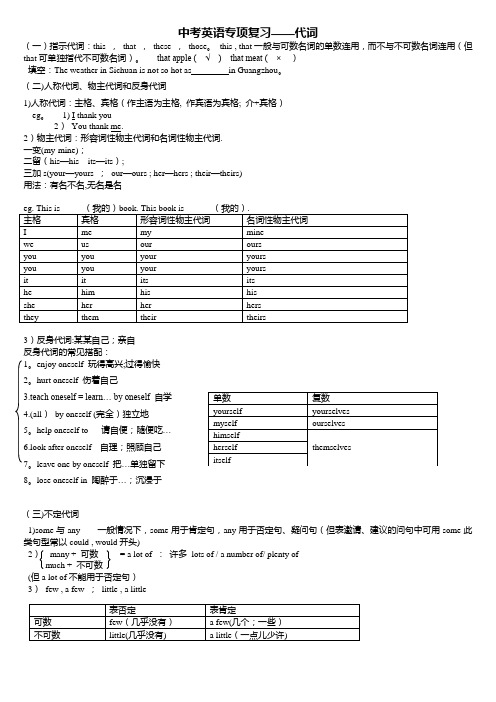
中考英语专项复习——代词(一)指示代词:this , that , these , those 。
this , that 一般与可数名词的单数连用,而不与不可数名词连用(但that 可单独指代不可数名词)。
that apple ( √ ) that meat ( × )填空:The weather in Sichuan is not so hot as __ in Guangzhou 。
(二)人称代词、物主代词和反身代词1)人称代词:主格、宾格(作主语为主格, 作宾语为宾格; 介+宾格)eg 。
1) I thank you2) You thank me.2)物主代词:形容词性物主代词和名词性物主代词.一变(my-mine);二留(his —his its —its );三加s(your —yours ; our —ours ; her —hers ; their —theirs)用法:有名不名,无名是名3)反身代词:某某自己;亲自反身代词的常见搭配:1。
enjoy oneself 玩得高兴;过得愉快2。
hurt oneself 伤着自己3.teach oneself = learn… by oneself 自学4.(all ) by oneself (完全)独立地5。
help oneself to 请自便;随便吃…6.look after oneself 自理;照顾自己7。
leave one by oneself 把…单独留下8。
lose oneself in 陶醉于…;沉浸于(三)不定代词1)some与any一般情况下,some 用于肯定句,any 用于否定句、疑问句(但表邀请、建议的问句中可用some-此类句型常以could , would 开头)2) many + 可数 = a lot of : 许多 lots of / a number of/ plenty ofmuch + 不可数(但a lot of 不能用于否定句)3) few , a few ; little , a little①。
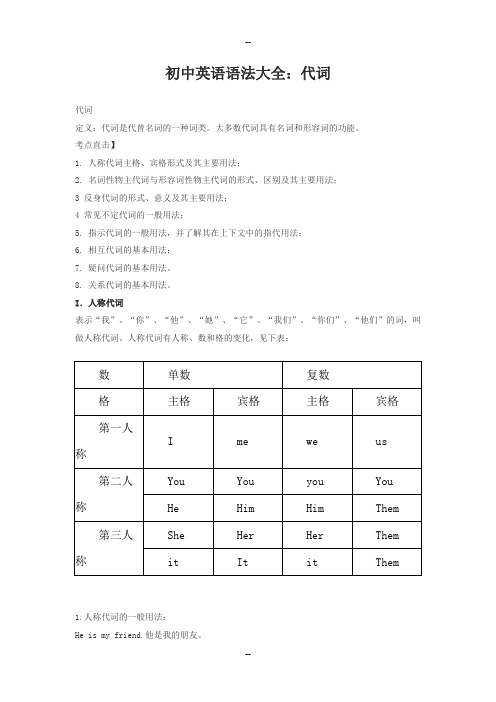
初中英语语法大全:代词代词定义:代词是代替名词的一种词类。
大多数代词具有名词和形容词的功能。
考点直击】1. 人称代词主格、宾格形式及其主要用法;2. 名词性物主代词与形容词性物主代词的形式、区别及其主要用法;3 反身代词的形式、意义及其主要用法;4 常见不定代词的一般用法;5. 指示代词的一般用法,并了解其在上下文中的指代用法;6. 相互代词的基本用法;7. 疑问代词的基本用法。
8. 关系代词的基本用法。
I.人称代词表示“我”、“你”、“他”、“她”、“它”、“我们”、“你们”、“他们”的词,叫做人称代词。
人称代词有人称、数和格的变化,见下表:1.人称代词的一般用法:He is my friend.他是我的朋友。
It's me. 是我。
My dog likes him.我的狗喜欢他。
(1)作主语(用主格)I like table tennis. 我喜欢打乒乓球。
He is a student. 他是个学生。
(2)作表语(用主格,口语中常用宾格)Who is there?It's me(I). 是谁啊?是我。
(3)作宾语(用宾格)Do you know him?你认识他吗?Come with me. 跟我来。
注意I(我)无论放在句首、句中或句尾,都要大写。
2 特殊用法的人称代词It will rain tomorrow. 明天会下雨。
They speak English in the country. 在那个国家,人们说英语。
人称的习惯顺序:(1)如果有几个不同的人称同时作主语,且用and,or连接时,习惯顺序是:单数:you,he,and I复数:we,you,and they但是,如果是做错事,承担责任时,有时,说话的人把I(我)放在第一位。
----Who broke the Window?谁打碎了玻璃?---I and Li Ming. 我和李明.(2)we,you,they的特殊用法we,you,they有时并非指特定的人,译时不必译出“我们”、“你们”、“他们”。
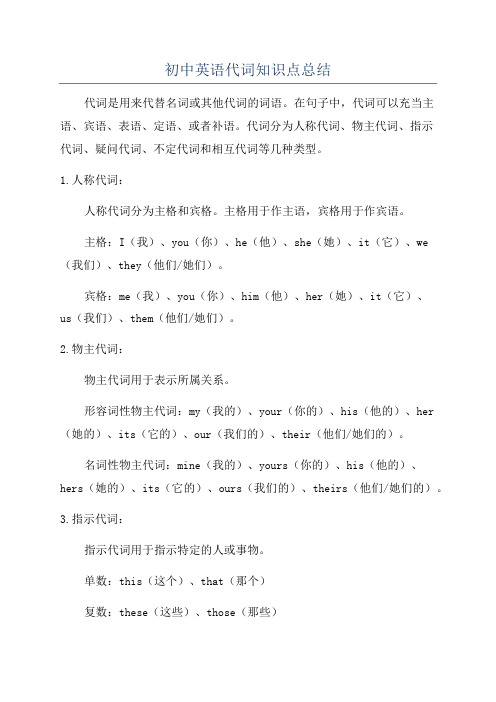
初中英语代词知识点总结代词是用来代替名词或其他代词的词语。
在句子中,代词可以充当主语、宾语、表语、定语、或者补语。
代词分为人称代词、物主代词、指示代词、疑问代词、不定代词和相互代词等几种类型。
1.人称代词:人称代词分为主格和宾格。
主格用于作主语,宾格用于作宾语。
主格:I(我)、you(你)、he(他)、she(她)、it(它)、we (我们)、they(他们/她们)。
宾格:me(我)、you(你)、him(他)、her(她)、it(它)、us(我们)、them(他们/她们)。
2.物主代词:物主代词用于表示所属关系。
形容词性物主代词:my(我的)、your(你的)、his(他的)、her (她的)、its(它的)、our(我们的)、their(他们/她们的)。
名词性物主代词:mine(我的)、yours(你的)、his(他的)、hers(她的)、its(它的)、ours(我们的)、theirs(他们/她们的)。
3.指示代词:指示代词用于指示特定的人或事物。
单数:this(这个)、that(那个)复数:these(这些)、those(那些)4.疑问代词:疑问代词用于引导疑问句。
主格:who(谁)、what(什么)宾格:whom(谁)5.不定代词:不定代词指代不特定的人或事物。
some(一些)、any(一些)、no(没有)、none(没有人/物)、something(事)、anybody(任何人)6.相互代词:相互代词指互相之间的关系。
each other(彼此)、one another(互相)在运用代词时,要注意代词的数(单数/复数)、格(主格/宾格)、性(男/女/中性)、以及与名词之间的一致性等规则。
通过多练习和阅读,可以更好地掌握代词的用法。

中考代词知识点梳理篇一:中考代词知识点代词知识点考点一、人称代词分为主格和宾格主格:在句子中充当主语,是动作的执行者。
宾格:在句子中充当宾语,是动作的承担者。
用法:动词、介词后面用人称代词的宾格(动介之后用人宾),在句中作表语时常用宾格He often beats me. / Look at her, her dress is very beautiful. / It’s me.★★it的用法:①作形式主语eg:It is very important to learn English well. 真正的主语是后面的to learn English well —To Learn English well is very important.②作形式宾语eg:I found it is important to learn English well. 真正的宾语是后面的to learn English well —I found to learn English well is important.③指代时间、天气、人等eg:It’s 9 o’clock. / It’s Monday today. / It was sunny yesterday. / It’s me.④用于强调句中eg:It is Li Ming who is a dictor.⑤用于前面提到的单数名词eg:I have a pen, it is black.★两个或两个人称代词连用时,要注意:单数时—2-3-1(你-他-我)自己始终放在最后面eg:You, he and I will go to Badong. / The teacher wants you, Jim and me to have a rest. 复数时—1-2-3(我-你-他)eg:We, you and the twins want to eat some candy.考点二、物主代词形容词性物主代词(形物代)& 名词性物主代词(名物代)用法:① 是用形物代还是名物代,要看它后面紧跟的那个词。

初中英语语法梳理和提高---代词总结与精讲(含答案)代词知识梳理:提纲挈领,抓住重点和难点!一、代词的分类英语中常把代词分为人称代词、无主代词、反身代词、指示代词、疑问代词、连接代词、不定代词和相互代词。
二、代词的用法1.人称代词:人称代词是指人的代词,有性、数、格的区别。
表示“我” “你” “他” “我们” “你们” “他们”。
请看下表:(1)(2)宾格在句中作宾语。
例如:They don’t want me to go there alone.Don’t worry. I can lo ok after her.(3)宾格还可以作宾格。
特别是在口语中。
例如:--- Who’s that? --- It’s me.注意:①人称代词we, you, they 可以用来表示一般人。
例如:You cannot go into the hall with slippers. 不准穿拖鞋进入大厅。
②人称代的主格作表语,一般都在正中的谈话中,表示强调。
例如:It was he who took away the necklace. 是他拿走了那条项链。
③人称代词she可以用指代祖国、大地、月亮、轮船等。
例如:The ship is leaving. She’s on her first trip to Boston. 轮船要起航了。
这时她第一次去波士顿。
We love our country, we hope she’ll be stronger and stronger. 我们热爱我们的祖国,我们希望她越来越强大。
④It作为人称代词时,可以表示天气、距离、时间、环境等。
例如:It is about 10 kilometres from here. 离这儿大约有10公里。
⑤It 还可用作形式主语或形式宾语,来代替由不定式,动词的-ing,形式或主语从句构成的真正的主语或宾语,以避免句子头重脚轻。
例如:It is not easy to learn English well.It is good for you taking a walk after supper.I found it difficult to sleep.⑥英语里当主语是并列的几个人时,人称代词的排列顺序和汉语不同,I 在最后,you 在最前;但是,当受到批评或时承认错误时正好相反,I 在最前,you在最后。
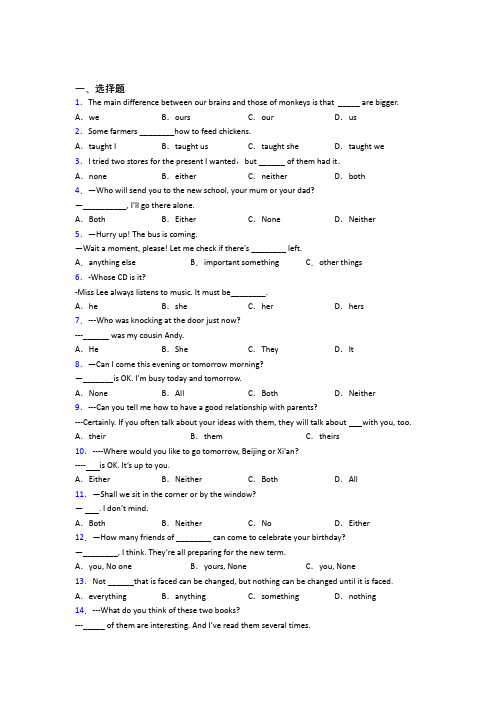

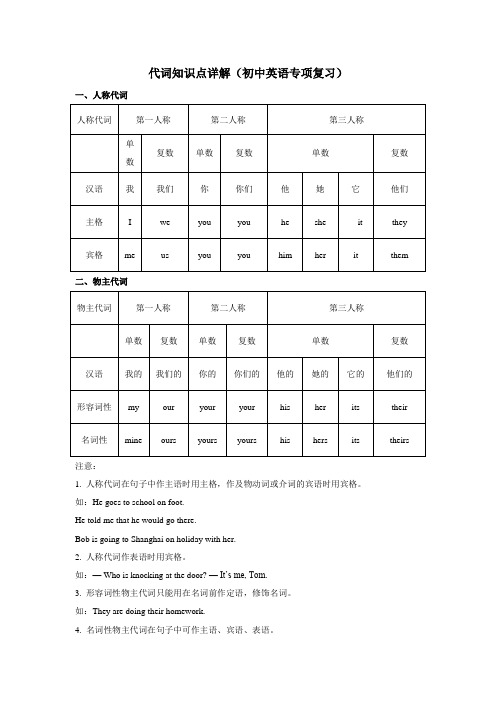
代词知识点详解(初中英语专项复习)一、人称代词二、物主代词注意:1. 人称代词在句子中作主语时用主格,作及物动词或介词的宾语时用宾格。
如:He goes to school on foot.He told me that he would go there.Bob is going to Shanghai on holiday with her.2. 人称代词作表语时用宾格。
如:— Who is knocking at the door? —It’s me, Tom.3. 形容词性物主代词只能用在名词前作定语,修饰名词。
如:They are doing their homework.4. 名词性物主代词在句子中可作主语、宾语、表语。
如:— Whose book is this?—It’s mine. Yours is under the table.I usually tidy my room. You should tidy yours.三、反身代词1)作宾语,表示反身代词与主语是同一人。
The girl is too young to look after herself. 这个女孩年纪太小,不能照顾自己。
Uncle Chen teaches himself English. 陈叔叔自学英语。
(2)作表语,常用于be, feel, seem, look等系动词之后,用来描述感觉、情绪或状态。
He is not himself today. 他今天不舒服。
I’m not feeling myself today. 我今天不太舒服。
(3)作同位语,表示强调,译成“亲自”“本人”。
You must do it yourself. 你必须自己做。
I myself did the homework last night. 昨晚是我自己做的家庭作业。
(4)用于固定搭配中。
by oneself独自;单独come to oneself苏醒dress oneself自己穿衣服enjoy oneself玩得开心help oneself to随便吃……四、指示代词1. 定义:表示"这个""那个""这些""那些"等指示概念的代词叫指示代词。
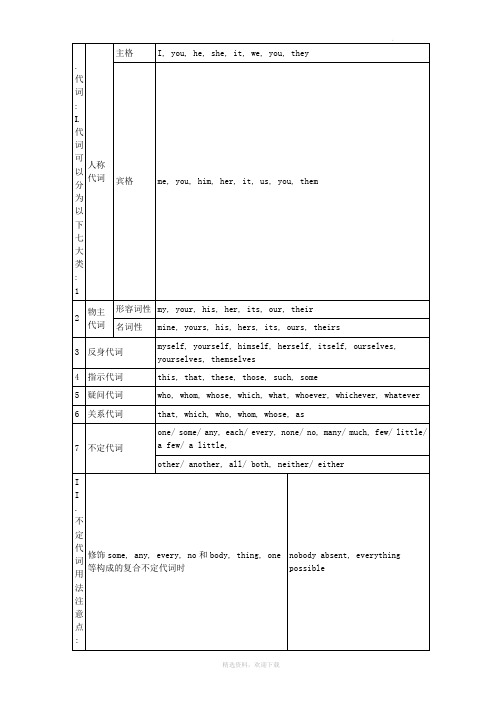
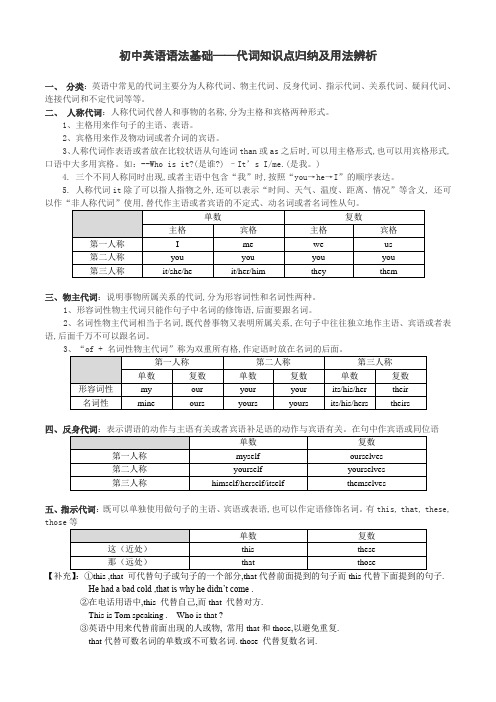
初中英语语法基础——代词知识点归纳及用法辨析一、分类:英语中常见的代词主要分为人称代词、物主代词、反身代词、指示代词、关系代词、疑问代词、连接代词和不定代词等等。
二、人称代词:人称代词代替人和事物的名称,分为主格和宾格两种形式。
1、主格用来作句子的主语、表语。
2、宾格用来作及物动词或者介词的宾语。
3、人称代词作表语或者放在比较状语从句连词than或as之后时,可以用主格形式,也可以用宾格形式,口语中大多用宾格。
如:--Who is it?(是谁?) –It’s I/me.(是我。
)4. 三个不同人称同时出现,或者主语中包含“我”时,按照“you→he→I”的顺序表达。
5. 人称代词it除了可以指人指物之外,还可以表示“时间、天气、温度、距离、情况”等含义, 还可以作“非人称代词”使用,替代作主语或者宾语的不定式、动名词或者名词性从句。
三、物主代词:说明事物所属关系的代词,分为形容词性和名词性两种。
1、形容词性物主代词只能作句子中名词的修饰语,后面要跟名词。
2、名词性物主代词相当于名词,既代替事物又表明所属关系,在句子中往往独立地作主语、宾语或者表语,后面千万不可以跟名词。
3、“of + 名词性物主代词”称为双重所有格,作定语时放在名词的后面。
四、反身代词:表示谓语的动作与主语有关或者宾语补足语的动作与宾语有关。
在句中作宾语或同位语五、指示代词:既可以单独使用做句子的主语、宾语或表语,也可以作定语修饰名词。
有this, that, these, those【补充】:①this ,that 可代替句子或句子的一个部分,that代替前面提到的句子而this代替下面提到的句子.He had a bad cold ,that is why he didn’t come .②在电话用语中,this 代替自己,而that 代替对方.This is Tom speaking . Who is that ?③英语中用来代替前面出现的人或物, 常用that和those,以避免重复.that代替可数名词的单数或不可数名词. those 代替复数名词.六、关系代词:用来引导定语从句的代词叫关系代词。
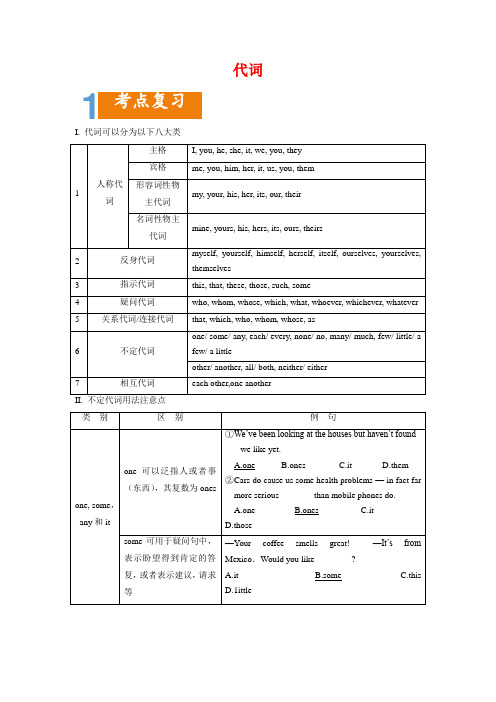
代词1I. 代词可以分为以下八大类一、单项选择 1. —Is this ________ pencil? —No, it isn’t. It’s ________. A. your, her B. your, my C. your, his D. her, her 2. —What’s that, Tom?— ________ a pencil. A. It’s B. Is C. I am D. That’s3. —Which sport do you like, football or basketball?— ________, I like swimming.A. EitherB. NoneC. NeitherD. Both 知识强化 24. —Tomorrow is Mother’s Day. What are you going to buy for your mother?—I’m not sure. But I’ll buy her ________.A. something specialB. anything specialC. special somethingD. special anything5. _______ name is Tina. _______ am a girl.A. I, myB. My, IC. My, myD. I, I6. —Who is that girl over there?—_______ a Chinese singer.A. She’sB. He’sC. It’sD. They’re7. It is necessary ________ to our parents when we have problem.A. to talkB. talkingC. talkD. talked8. —What color is ________ ruler?—________ ruler is red.A. your; IB. your; MyC. you; MyD. you; I9. —What’s your number?—________ is 587.A. HeB. ThisC. ThatD. It10. —Is ________ Lucy?—No, her name is Cindy.A. heB. hisC. sheD. her11. He doesn’t find _________interesting _________elephants playing soccer.A. this, watchB. it, to watchC. that, watchingD. it, watching12. Miss Gao is ________ teacher. She teaches ________ English.A. our, myB. us, meC. us, ourD. our, us13. —Is that a picture of your mother?—Yes, that was 15 years ago.A. sheB. herC. hersD. herself14. Look! How big the watermelon is! Let’s ________ first.A. cut up themB. cut them upC. cut it upD. cut up it15. —How much are your shoes? — ________ 20 yuan.A. It’sB. ItC. They’reD. That’s16. These shirts ________ only 5 dollars. Do you like ________?A. are;theyB. is;themC. are;themD. is;its17. My little brother really enjoys ________ English class this term.A. heB. himC. hisD. himself18. —Daming, can you teach ________ how to use chopsticks?—Sure. We use chopsticks every day and it is ________ Chinese tradition.A. me, ourB. my, yourC. me, oursD. mine, our19. Sun Hongsheng lost his arms after an accident at the age of six, ________ he adapted (适应)quickly and went to school like ________ children, learning to write with his feet.A. although; anotherB. but; otherC. but; anotherD. although; other20. It’s silly ________ you ________ you r car at such a low price.A. for; to sellB. of; sellC. for; sellD. of; to sell21. These sweaters are too small for me. Would you show me ________ one?A. the otherB. otherC. anotherD. else22. ________ like ice cream.A. He and IB. I and heC. He and meD. I and him23. —What did you learn from the epidemic?—________ is more important than people’s safety and health.A. EverythingB. AnythingC. SomethingD. Nothing24. —I lost my ID card yesterday and I couldn’t find ________ anywhere.—You’d bet ter reapply for (补办) ________ as soon as possible. We may need it anytime.A. it; thatB. it; oneC. one; itD. one; that25. In 50 years, people will have more free time because there will be _________ things to do.A. fewerB. fewC. lessD. little26. —This T-shirt isn’t fit for me. Could you show me ________ T-shirt?—Sure. What about this one?A. anotherB. othersC. the otherD. other27. It’s important ________ English every day.A. of us to readB. for us to readC. for us readingD. we must read28. —Did you see two Japanese here?—Yes, but they’ve gone. One took a taxi, ________ went on foot.A. anotherB. the othersC. otherD. the other29. —Who helped the children with their homework?—Nobody. They did it by ________.A. themB. theirC. theirsD. themselves30. —Whose mask is it? Is it ________, Lin Lin?—No, it can’t belong to ________. Mine is black.A. yours, mineB. you, meC. yours, meD. you, mine31. You can ask anyone for help. ________ here is willing to lend you a hand.A. OneB. No oneC. EveryoneD. Someone32. There are many monkeys around ________, they are looking at ________ bananas.A. they, ourB. they, themC. them, theirD. them, them33. Do you want ________ juice? No, I don’t want ________ drinks.A. some, someB. any, someC. some, anyD. any, any34. Is there ________ in today’s newspaper?A. everything interestingB. interesting somethingC. anything interestingD. interesting anything35. —I can’t believe George could make such a silly mistake.—Don’t be sad. ________ of us is perfect.A. EachB. NoneC. NeitherD. Either36. Each time I read books on science, I can find________.A. new anythingB. everything newC. new nothingD. something new37. —My son, you should know that learning is a lifelong journey because every day brings ________ to you.— I see, dad. Thank you.A. anything newB. something newC. new somethingD. new anything38. — Is this ________ book, Tony?—No. Lucy’s name is on it. Maybe it’s ________.A. your; herB. your; hersC. yours; herD. yours; hers39. You are no longer young and can be responsible for ________.A. myselfB. yourselfC. himselfD. herself40. —Excuse me, I’d like to buy a birthday present for my brother.— We have different kinds of new toys for boys. You can choose _______ for him.A. thatB. oneC. itD. this二、短文填空1阅读下面短文,根据语境、音标或所给单词的提示,在每个空格内填入一个恰当的词,要求所填的词意义准确、形式正确,使短文意思完整、行文连贯。
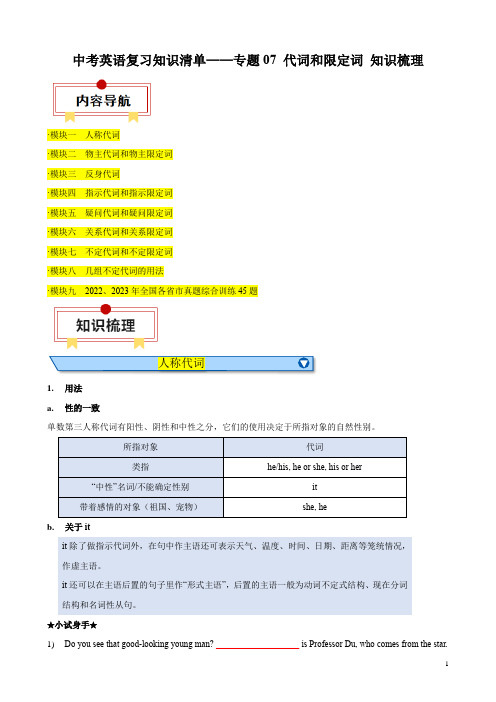
中考英语复习知识清单——专题07 代词和限定词知识梳理·模块一人称代词·模块二物主代词和物主限定词·模块三反身代词·模块四指示代词和指示限定词·模块五疑问代词和疑问限定词·模块六关系代词和关系限定词·模块七不定代词和不定限定词·模块八几组不定代词的用法·模块九2022、2023年全国各省市真题综合训练45题1.用法a.性的一致单数第三人称代词有阳性、阴性和中性之分,它们的使用决定于所指对象的自然性别。
所指对象代词类指he/his, he or she, his or her“中性”名词/不能确定性别it带着感情的对象(祖国、宠物)she, heb.关于itit除了做指示代词外,在句中作主语还可表示天气、温度、时间、日期、距离等笼统情况,作虚主语。
it还可以在主语后置的句子里作“形式主语”,后置的主语一般为动词不定式结构、现在分词结构和名词性从句。
★小试身手★1)Do you see that good-looking young man? ___________________ is Professor Du, who comes from the star.人称代词2) A teacher should offer ___________________ students challenging projects. 3) I love China very much. ___________________ is very beautiful. 4) I have a pet dog. ___________________ follows me wherever I go.5) Who is it? –It’s (I/___________________).6) ___________________ illegal to drive without a license.7) ___________________ no use arguing with him.类型词汇 用法 物主限定词my 、your 、his 、her 、its 、our 、their 后面必须跟名词 物主代词 mine 、yours 、his 、hers 、ours 、theirs ;its 既可单独使用,也可用于“双重属格”★小试身手★1) My husband’s father is a doctor. ___________________(My/Mine) is a lawyer.I plan to enter for a summer camp with a friend of ___________________. (me)1. 形式人称单数 复数 第一人称myself ourselves 第二人称 yourselfyourselves 第三人称 himselfthemselves herselfitself2. 用法★小试身手★填空并判断以下句中反身代词的成分: 1) The queen ___________________ attended the meeting. (作同位语,表强调)2) I cut ___________________ shaving this morning. (作宾语)3) I could hardly believe she had made a video about water pollution by ___________________. (her) (作介词补足成分)4) Frank is not quite ___________________ today. (upset or ill) (作主语补语, feel like myself (精神或身体物主代词和物主限定词反身代词好,not be oneself, not feel like oneself(精神或身体状态不佳))5)Just between ___________________, he is a selfish man. (固定搭配between ourselves, 你知我知)6)Those who smoke heavily should remind ___________________ of health, the bad smell and the feelings ofother people.A. theirsB. themC. themselvesD. oneself3.中考常考固定搭配连线:1)help oneself to……别客气!2)enjoy oneself 过得愉快,玩得高兴3)(all) by oneself 随便取,随便吃,随便喝4)say to oneself 自言自语5)teach oneself = learn by oneself 自首6)make yourself at home. 单独地,独自地7)play with oneself 自娱自乐8)turn oneself in 自学9)find oneself 找到自我** introduce / blame oneself指示代词和指示限定词1.指近还是指远指近this/these指远that/those1)These are new books. (These/___________________)are old ones.2)Life is not easy in the US (___________________/those) days.3)Life was not easy in the US (these/___________________) days.2.指人还是指物指示代词通常指物,但在介绍人或电话交谈时,可以指人。
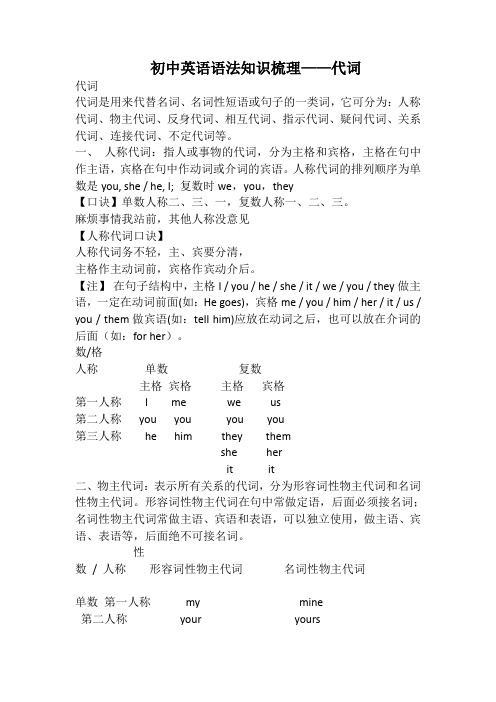
初中英语语法知识梳理——代词代词代词是用来代替名词、名词性短语或句子的一类词,它可分为:人称代词、物主代词、反身代词、相互代词、指示代词、疑问代词、关系代词、连接代词、不定代词等。
一、人称代词:指人或事物的代词,分为主格和宾格,主格在句中作主语,宾格在句中作动词或介词的宾语。
人称代词的排列顺序为单数是you, she / he, I; 复数时we,you,they【口诀】单数人称二、三、一,复数人称一、二、三。
麻烦事情我站前,其他人称没意见【人称代词口诀】人称代词务不轻,主、宾要分清,主格作主动词前,宾格作宾动介后。
【注】在句子结构中,主格I / you / he / she / it / we / you / they做主语,一定在动词前面(如:He goes),宾格me / you / him / her / it / us / you / them做宾语(如:tell him)应放在动词之后,也可以放在介词的后面(如:for her)。
数/格人称单数复数主格宾格主格宾格第一人称I me we us第二人称you you you you第三人称he him they themshe herit it二、物主代词:表示所有关系的代词,分为形容词性物主代词和名词性物主代词。
形容词性物主代词在句中常做定语,后面必须接名词;名词性物主代词常做主语、宾语和表语,可以独立使用,做主语、宾语、表语等,后面绝不可接名词。
性数/ 人称形容词性物主代词名词性物主代词单数第一人称my mine第二人称your yours第三人称his hisher hersits its复数第一人称our ours第二人称your yours第三人称their theirs【物主代词用法口诀】物主代词两类型,形容词与名词性。
形容词性作定语,后面定把名词用。
名词性要独立用,主宾表语它都充。
【速记口诀】物主代词分形、名,形式用法各不同;形容词性先出场:我的my你的your;男的his女的her,它的its不加撇;我们的our他们的their,别忘记!物主代词形变名,多数词尾加“s”;my变mine须分明,his和its 是本身;形跟名词,名不跟,用法牢记不会错!【注】“形跟名词,名不跟。
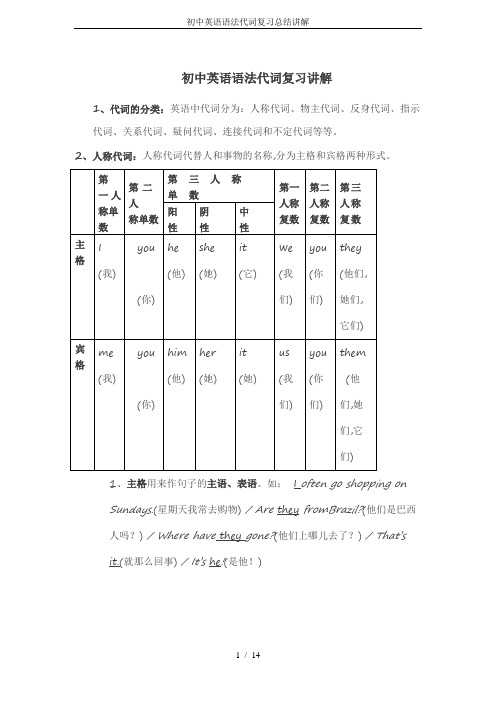
初中英语语法代词复习讲解1、代词的分类:英语中代词分为:人称代词、物主代词、反身代词、指示代词、关系代词、疑问代词、连接代词和不定代词等等。
2、人称代词:人称代词代替人和事物的名称,分为主格和宾格两种形式。
第一人称单数第二人称单数第三人称单数第一人称复数第二人称复数第三人称复数阳性阴性中性主格I(我)you(你)he(他)she(她)it(它)we(我们)you(你们)they(他们,她们,它们)宾格me(我)you(你)him(他)her(她)it(她)us(我们)you(你们)them(他们,她们,它们)1、主格用来作句子的主语、表语。
如:I often go shopping on Sundays.(星期天我常去购物) / Are they fromBrazil?(他们是巴西人吗?) / Where have they gone?(他们上哪儿去了?)/ That’s it.(就那么回事)/ It’s he!(是他!)2、宾格用来作及物动词或者介词的宾语。
如:Who teaches youEnglishthis year?(今年谁教你们的英语?) / Help me!(救救我!) /We often write letters to her.(我们常给他写信)3、人称代词作表语或者放在比较状语从句连词than或as之后时,可以用主格形式,也可以用宾格形式,口语中大多用宾格。
如:--Who isit?(是谁?)–It’s I/me.(是我。
)4、三个不同人称同时出现,或者主语中包含“我”时,按照“y ou→he→I”的顺序表达。
如:Both he and I are working at that computer company.(我和他都在那家电脑公司上班) –Who will go there?(谁要去那儿?) –Youand me.(你和我)5、人称代词it除了可以指人指物之外,还可以表示“时间、天气、温度、距离、情况”等含义,此外还可以作“非人称代词”使用,替代作主语或者宾语的不定式、动名词或者名词性从句。

中考英语代词语法知识汇总【名师精讲9类代词用法,值得下载学习】代词的分类:人称代词、物主代词、反身代词、指示代词、关系代词、疑问代词、连接代词和不定代词等。
1、人称代词:人称代词代替人和事物的名称,分为主格和宾格两种形式。
I often go shopping on Sundays.(星期天我常去购物)Are they from Brazil?(他们是巴西人吗?)Where have they gone?(他们上哪儿去了?)It’s he!(是他!)(2)宾格用来作及物动词或者介词的宾语。
Who teaches you English this year?(今年谁教你们的英语?) Help me!(救救我!)We often write letters to her.(我们常给他写信)(3)人称代词作表语或者放在比较状语从句连词than或as 之后时,可以用主格形式,也可以用宾格形式,口语中大多用宾格。
–It’s I/me.(是我。
)(4)三个不同人称同时出现,或者主语中包含“我”时,按照“you→he→I”的顺序表达。
Both he and I are working at that computer company.(我和他都在那家电脑公司上班)–Who will go there?(谁要去那儿?)–You and me.(你和我)(5)人称代词it除了可以指人指物之外,还可以表示“时间、天气、温度、距离、情况”等含义,此外还可以作“非人称代词”使用,替代作主语或者宾语的不定式、动名词或者名词性从句。
--What’s the time?(几点啦?)–It’s 12:00.(12点)It’s a long way to go.(那可要走好长的路)It took him three days to clean his house..(打扫屋子花了他三天的时间)It is very clear that the public want to know when these men can go into space(很显然,公众想知道这些人什么时候能进入太空)2、物主代词:说明事物所属关系的代词,分为形容词性和名词名词。
一、选择题1.— Would you mind my using your camera?—Sorry, there’s _______ with it.A.wrong something B.wrong anythingC.anything wrong D.something wrong2.—How many friends of ________ can come to celebrate your birthday?—________, I think. They’re all pr eparing for the new term.A.you, No one B.yours, None C.you, None 3.—Sonia, is this your dictionary?—Oh, no, it’s not ______. Ask Li Lei. He is looking for ______.A.me; hers B.mine; him C.my; her D.mine; his4.I tried two stores for the present I wanted,but ______ of them had it.A.none B.either C.neither D.both5._____classroom is quite different from _____.A.Their; we B.Theirs; us C.Their; ours D.They; ourselves 6.As volunteers, they should do ______to help the children in trouble.A.nothing B.anybodyC.something D.somebody7.—Did you buy a large house?—No, not really, at least not as large as ______.A.yours B.your C.you8.—Can I come this evening or tomorrow morning?—_______is OK. I’m busy today and tomorrow.A.None B.All C.Both D.Neither9.---Can you tell me how to have a good relationship with parents?---Certainly. If you often talk about your ideas with them, they will talk about with you, too. A.their B.them C.theirs10.Mr. Wang recommended me a few foreign movies, but ____was to my taste.A.all B.neither C.nothing D.none 11.—Shall we sit in the corner or by the window?—. I don’t mind.A.Both B.Neither C.No D.Either 12.—Hi. Jack. Our T-shirts are the same.—Yes, But ________ looks newer.A.his B.yours C.you D.him13.I left a message to my parents yesterday, but ______ of them called me back.A.both B.none C.neither14.---What do you think of these two books?---_____ of them are interesting. And I’ve read them several times.A.Both B.Neither C.None D.Either 15.Not ______that is faced can be changed, but nothing can be changed until it is faced. A.everything B.anything C.something D.nothing 16.Dear boys and girls, you will face the most important examination in less than 100 days. ________________ and go out of your way, and you will get a satisfying result.A.Have confidence in yourself B.Being confident of yourselfC.Have confidence in yourselves17.As for__________students from Grade 9, the biggest __________ is learning how to take care of ourselves as well as improve our grades.A.us , challenge B.Our, chance C.we , choice18.--The story is so amazing! It’s the most interesting story I’ve ever read.--But I’m afraid it won’t be liked by________.A.everybody B.somebody C.anybody D.nobody19._____ in the world is difficult for one who sets his mind to it.A.Everything B.Something C.Anything D.Nothing20.I always believe that is difficult if we try our best to do it.A.something B.anything C.everything D.nothing 21.—How was the meeting yesterday afternoon?—Almost ________ cam e because of the terrible weather. We’ve put it off till next week. A.something B.anything C.nobody D.everybody 22.—Sonia, is this your dictionary?—Oh, no, it’s not _______. Ask Tom, he is looking for ______.A.mine, his B.my, him C.me, his D.yours, his23.--What about these two coats, madam?--________ of them fits me. Could you show me ________ one?A.Either; other B.Neither; another C.Neither; else D.Either; another 24.My mother is a teacher. She loves students very much.A.her B.his C.my D.your25.I’m surprised at the new look of hometown.A.I B.me C.my D.mine【参考答案】***试卷处理标记,请不要删除一、选择题1.D解析:D【解析】【分析】【详解】句意:-你介意我用一下你的照相机吗?-对不起,它出了点毛病。
something某事,某物,是不定代词,用于肯定句中;anything任何事,常用于否定句中;wrong问题,毛病,形容词,应放在不定代词的后面。
这里使用的句型是There is something wrong with…意为“…有毛病(坏了)”,是肯定句,故应选D。
2.B解析:B【解析】【分析】【详解】句意“-你有多少朋友能来庆祝你的生日?-我认为没有,他们所有人都为新学期做准备”。
friends of yours你的朋友;no one没有人,指人,用who问;none没有人或物,用how many或how much提问。
根据第一句话中的how many可知,用none,故选B。
3.D解析:D【解析】试题分析:句意:--苏三,这是你的字典吗?--啊,不是我的,去问问李磊吧,他正在找他的。
形容性物主代词是物主代词的一种(另一种为人称代词),置于名词前,起修饰作用,表示某人的,名词性物主代词起名词的作用。
名词性物主代词=形容词性物主代词+名词。
只有上文提及了某个名词,才会知道名词性物主代词指代的事物。
后面是名词的话,前面就要用形容词性物主代词。
后面没有名词的话,就用名词性物主代词。
结合句意,故选D考点:考查物主代词的用法。
4.C解析:C【解析】【详解】C 考查代词用法。
句意:我试了两个商店买我想要的礼物,但他们两个都没有。
both表示两者"都"(强调全体);"两者之一",用于两者(强调个体); neither"两个都不",用于否定两者;none"没有一个人/物",用于否定三者或三者以上的可数名词.根据I tried two stores for the present I wanted,but ______ of them had it,可知这里but前后是转折关系,后面应该是两个都没有,这里用neither。
故选C.5.C解析:C【解析】【详解】句意:他们的教室不同于我们的教室。
考查物主代词。
第一个空,设空处后面有名词classroom,所以应用形容词性的物主代词,their他们的,符合题意,theirs他们的,是名词性的物主代词,they他们,是人称代词的主格,都不符合题意,所以排除B、D选项。
第二个空,根据句意“他们的教室不同于我们的教室。
”设空处后面没有名词,所以应用名词性的物主代词,we我们,人称代词主格,不符合题意,ours我们的,名词性物主代词,相当于our classroom,符合题意,故排除A选项;故答案选C。